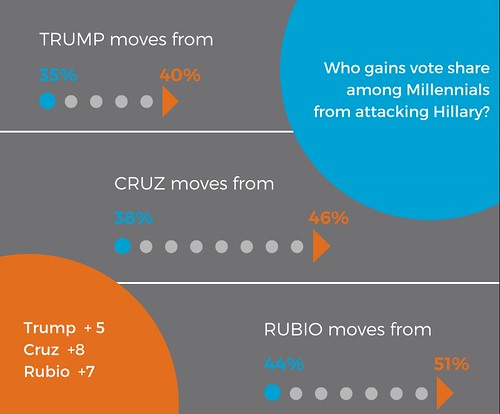In order for Hillary Clinton to win the presidency, she'll likely need to foster and exploit a wide gender gap among women, and win Millennial voters by a large margin. Mitt Romney carried 37 percent of young voters in 2012, a number the next GOP nominee will seek to improve upon. A political research group called Evolving Strategies is out with new findings that may offer a partial roadmap to help achieve that goal. Their data suggests that the Benghazi massacre and its aftermath could be something of an Achilles Heel for Mrs. Clinton among the youngest cohort of voters. Here's how the organization describes the methodology behind their latest project:
An attack ad centered on Benghazi...moves Millennial [voters]. And Millennials move despite the fact that they don’t care about terrorism nearly as much as their elders. Regardless of Hillary’s performance in the hearings, she hasn’t left Benghazi behind her. It makes you wonder what else could be even more damaging. Hillary is fragile with voters who should be her solid base — Millennials — on issues that should be her greatest strength — foreign affairs and her leadership as Secretary of State. We conducted a randomized-controlled trial with over 1,000 respondents aged 18 to 34 — the age group known as Millennials. We randomly assigned respondents to view either an ad attacking Hillary Clinton on the Benghazi tragedy — the treatment group — or a non-political commercial — the placebo-control group. We compared the vote outcome in the treatment group to the control group using statistical analyses to determine the impact from the ads. The sample was recruited from Amazon’s Mechanical Turk — an online marketplace for work — and the results were weighted to match the distribution of five-point partisanship in the Pew Research Center’s report, Millennials in Adulthood.
And here's the 30 second spot produced by Stop Hillary PAC ad to which the "treatment group" was exposed:
Before we get to the results, I'll briefly editorialize that this may not be the most impactful or focused Benghazi ad one might conceive of, as Hillary's infamous, perturbed "what difference does it make?" line is taken somewhat out of context. I suspect ad-makers would be wiser to focus on the former Secretary of State's central role in pushing for the strategic fiasco that was America's intervention in Libya (which now lies in ruins as a failed state overrun by jihadists), to highlight her failure to keep US diplomats safe (her State Department ignored glaring warning signs and actually reduced security measures in Benghazi as the security situation on the ground deteriorated), and her shameful decision to accuse victims' families of lying in order to protect the false narrative regarding her politically-motivated mischaracterizations of the attack. In any case, those young voters who watched the commercial above were noticeably less likely to support Hillary in general election match-ups against the three leading Republicans running for president:

Ted Cruz moves from Romney-level support within the "control" contingent to 46 percent support among those who saw the ad. Donald Trump, who garners the worst numbers within the GOP trio, sees a five-point bump. And Marco Rubio, whose Millennial support was already the best of the bunch by a fair distance, bounces to slim majority support within the latter group of young voters. All sorts of caveats apply here: Democrats will spend a fortune on their own focus-grouped attacks against the eventual nominee, which could mitigate, cancel out, or overtake the anti-Hillary impulse demonstrated by this study. And conservatives should resist the fanciful notion of Benghazi as a silver bullet against their opponents' presumptive nominee. But ensuring that different groups of voters are made aware of Hillary Clinton's abysmal record on the issue, as well as her self-interested dishonesty after the fact, could pay significant dividends.
